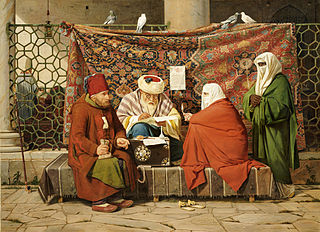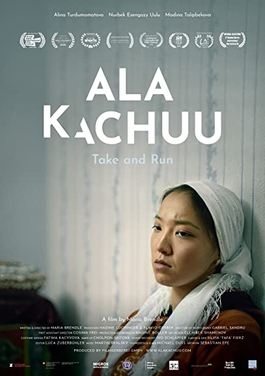Related Research Articles

Virginity is the state of a person who has never engaged in sexual intercourse. The term virgin originally only referred to sexually inexperienced women, but has evolved to encompass a range of definitions, as found in traditional, modern and ethical concepts. Heterosexual individuals may or may not consider loss of virginity to occur only through penile-vaginal penetration, while people of other sexual orientations often include oral sex, anal sex, or manual sex in their definitions of losing one's virginity.

Elopement is a marriage which is conducted in a sudden and secretive fashion, sometimes involving a hurried flight away from one's place of residence together with one's beloved with the intention of getting married without parental approval. An elopement is contrasted with an abduction, in which either the bride or groom has not consented, or a shotgun wedding in which the parents of one coerce both into marriage.

In Islam, nikah is a contract exclusively between a man and woman. Both the groom and the bride are to consent to the marriage of their own free wills. A formal, binding contract – verbal or on paper – is considered integral to a religiously valid Islamic marriage, and outlines the rights and responsibilities of the groom and bride. Divorce in Islam can take a variety of forms, some executed by a husband personally and some executed by a religious court on behalf of a plaintiff wife who is successful in her legal divorce petition for valid cause. Islamic marital jurisprudence allows Muslim men to be married to multiple women.

Bride kidnapping, also known as marriage by abduction or marriage by capture, is a practice in which a man abducts and rapes the woman he wishes to marry.

Forced marriage is a marriage in which one or more of the parties is married without their consent or against their will. A marriage can also become a forced marriage even if both parties enter with full consent if one or both are later forced to stay in the marriage against their will.

The culture of Kyrgyzstan has a wide mix of ethnic groups and cultures, with the Kyrgyz being the majority group. It is generally considered that there are 40 Kyrgyz clans, symbolized by the 40-rayed yellow sun in the center of the flag. The red lines inside the sun visualise the crown of a yurt, the traditional dwelling of nomadic farmers, once the main population of the Central Asian area. The dominant religion of Kyrgyzstan is Sunni Islam (91%). The Russian population is Russian Orthodox.

Human rights in Kyrgyzstan improved after the ouster of President Askar Akayev in the 2005 Tulip Revolution and the installment of a more democratic government under Roza Otunbayeva. While the country is performing well compared to other states in Central Asia, many human rights violations still take place. While LGBT rights have been declining in recent years, freedom of press has been improving.

Ala kachuu is a form of bride kidnapping practiced in Kyrgyzstan. The term can apply to a variety of actions, ranging from a consensual elopement to a non-consensual kidnapping, and to what extent it actually happens is controversial. Some sources suggest that currently at least a third of Kyrgyzstan's brides are taken against their will.
The legal age of consent for sexual activity varies by jurisdiction across Asia. The specific activity engaged in or the gender of participants can also be relevant factors. Below is a discussion of the various laws dealing with this subject. The highlighted age refers to an age at or above which an individual can engage in unfettered sexual relations with another who is also at or above that age. Other variables, such as homosexual relations or close in age exceptions, may exist, and are noted when relevant.
The concept of rape, both as an abduction and in the sexual sense, makes its appearance in early religious texts.

The Kirghiz Soviet Socialist Republic, also known as the Kyrgyz Soviet Socialist Republic or Kirgiz Soviet Socialist Republic, was one of the constituent republics of the Soviet Union (USSR) from 1936 to 1991. It was also known by the names Kyrgyzstan and Soviet Kyrgyzstan in the Kyrgyz language, and as Kirghizia and Soviet Kirghizia in the Russian language. Landlocked and mountainous, it bordered Tajikistan and China to the south, Uzbekistan to the west and Kazakhstan to the north. The Kirghiz branch of the Communist Party of the Soviet Union governed the republic from 1936 until 1990.

Women in Kazakhstan are women who live in or are from Kazakhstan. Their position in society has been and is influenced by a variety of factors, including local traditions and customs, decades of Soviet regime, rapid social and economic changes and instability after independence, and new emerging Western values.

Women in Kyrgyzstan traditionally had assigned roles, although only the religious elite sequestered women as was done in other Muslim societies. Rural inhabitants continue the traditional Siberian tribal practice of bride kidnapping. Bride kidnapping, known as ala kachuu, girls as young as 12 years old are kidnapped for forced marriage, by being captured and carried away by groups of men or even relatives who, through violence or deception, take the girl to the abductor's family who forces and coerces the young woman to accept the illegal marriage. In most cases, the young woman is raped immediately in the name of marriage.[8]
Criticisms of marriage are arguments against the practical or moral value of the institution of matrimony or particular forms of matrimony. These have included the effects that marriage has on individual liberty, equality between the sexes, the relation between marriage and violence, philosophical questions about how much control can a government have over its population, the amount of control a person has over another, the financial risk when measured against the divorce rate, and questioning of the necessity to have a relationship sanctioned by government or religious authorities.
The Sicilian term fuitina refers to a practice that used to be common in Sicily and other areas of Southern Italy, whereby a young couple would elope in order to get married against the wishes of their families. The intent is that the prolonged absence of the fugitive couple would let their families presume that sexual intercourse had occurred and thus force them to consent to a so-called "rehabilitating wedding". While elopements of young couples are reported to be widespread in places such as Palermo, most of them only bear a surface relationship with traditional fuitine, as they are not necessarily aimed at a rehabilitating marriage.
Franca Viola is a Sicilian woman who became famous in the 1960s in Italy for refusing a "rehabilitating marriage" to her rapist after being kidnapped, held hostage for over one week, and raped frequently. She is considered to be the first Italian woman who had been raped to publicly refuse marriage. She and her family successfully prosecuted the rapist. The trial had a wide resonance in Italy, as Viola's behavior clashed with traditional social conventions in Southern Italy, whereby a woman would lose her honour if she refused to marry the man to whom she had lost her virginity. Franca Viola became a symbol of the cultural progress and emancipation of women in post-war Italy.

Ukuthwala is the South African term for bride kidnapping, the practice of a man abducting a young girl and forcing her into marriage, often with the consent of her parents. These "marriages by capture" occur mainly in rural parts of South Africa, in particular the Eastern Cape and KwaZulu-Natal. The Basotho call it tjhobediso. Among the Xhosa and Zulu people, ukuthwala was once an acceptable way for two young people in love to get married when their families opposed the match. Ukuthwala has been abused, however, "to victimize isolated rural women and enrich male relatives."
Forced pregnancy is the practice of forcing a woman or girl to become pregnant or remain pregnant against her will. This act is often as part of a forced marriage, as part of a programme of breeding slaves, or as part of a programme of genocide. Forced pregnancy is a form of reproductive coercion.
A marry-your-rapist law, marry-the-rapist law, or rape-marriage law is a rule of rape law in a jurisdiction under which a man who commits rape, sexual assault, statutory rape, abduction or other similar act is exonerated if he marries his female victim, or in some jurisdictions at least offers to marry her. The "marry-your-rapist" law is a legal way for the accused to avoid prosecution or punishment.

Ala Kachuu – Take and Run is a 2020 Swiss short film directed by Maria Brendle and produced by Nadine Lüchinger and Flavio Gerber, Filmgerberei. The film is about a Kyrgyz girl who falls victim to bride kidnapping.
References
- 1 2 Miłkowski K. M. Wymuszone małżeństwo w wyniku porwania w krajach Azji Centralnej Nowa Polityka Wschodnia 2017, nr 4 s. 191-203
- ↑ "The Rise of Non-Consensual Bride Kidnapping in Kazakhstan: Developing a Culturally-Informed and Gender-Sensitive Response". Wilson Center. 2011-07-07. Retrieved 2020-04-20.
- ↑ "Ala Kachuu - Bride Kidnapping in Kyrgyzstan". Restless Beings. Retrieved 2020-04-20.
- ↑ Oberon Amsterdam www.oberon.nl. "Bride Kidnapping in Kyrgyzstan | IDFA" . Retrieved 2020-04-20.